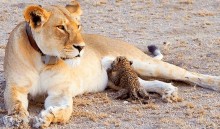Private guides and guided tours in Nigeria
Private guides in Nigeria
Private Guide in Lagos - Evans
(Member Since 2025) Languages: english, french, spanishHello! I am a professional tour guide with over 10 years of experience specializing in personalized tours across West Africa, including Nigeria, Benin, Togo, Ghana, and Côte d'Ivoire. I’m...

Nigeria
Language: English
Currency: Naira (NGN)
Calling Code: +234
CAPITAL CITY OF Nigeria: Abuja
LANGUAGE OF Nigeria: English
CURRENCY OF Nigeria: Naira (NGN)
COMMENTS ABOUT Nigeria:
Nigeria, officially named the Federal Republic of Nigeria, is a country in West Africa and the most populous country in Africa.
Cities : Abuja (Capital), Benin City, Calabar, Lagos, Port Harcourt, Sapele, Warri, Jos, Ibadan
Eat : Amala, Groundnut Stew, Draw soup, Eba, Egusi soup, Fried plantain or 'dodo', Fufu, Iru, Jollof, Moimoi, Ogbono soup, Suya, Sobo, Efo soup
Electricity : 230V/50Hz (UK plug)
Calling Code : +234
Time Zone : UTC+1
Following nearly 16 years of military rule, a new constitution was adopted in 1999, and a peaceful transition to civilian government was completed. The president faces the daunting task of rebuilding a petroleum-based economy, whose revenues have been squandered through corruption and mismanagement, and institutionalizing democracy. In addition, the OBASANJO administration must defuse longstanding ethnic and religious tensions, if it is to build a sound foundation for economic growth and political stability. Despite some irregularities, the April 2003 elections marked the first civilian transfer of power in Nigeria's history.
CLIMATE OF Nigeria: Varies; equatorial in south, tropical in center, arid in north. Natural hazards include periodic droughts and flooding.
RELIGION OF Nigeria: Muslim 50%, Christian 40%, indigenous beliefs 10%
POPULATION OF Nigeria: 137,253,133 - estimates for this country explicitly take into account the effects of excess mortality due to AIDS; this can result in lower life expectancy, higher infant mortality and death rates, lower population and growth rates, and changes in the distribution of population by age and sex than would otherwise be expected (July 2004 est.)>>>>
ECONOMY OVERVIEW OF Nigeria: Oil-rich Nigeria, long hobbled by political instability, corruption, inadequate infrastructure, and poor macroeconomic management, is undertaking some reforms under the new civilian administration. Nigeria's former military rulers failed to diversify the economy away from overdependence on the capital-intensive oil sector, which provides 20% of GDP, 95% of foreign exchange earnings, and about 65% of budgetary revenues. The largely subsistence agricultural sector has failed to keep up with rapid population growth - Nigeria is Africa's most populous country - and the country, once a large net exporter of food, now must import food. Following the signing of an IMF stand-by agreement in August 2000, Nigeria received a debt-restructuring deal from the Paris Club and a $1 billion credit from the IMF, both contingent on economic reforms. Nigeria pulled out of its IMF program in April 2002, after failing to meet spending and exchange rate targets, making it ineligible for additional debt forgiveness from the Paris Club. The government has lacked the political will to implement the market-oriented reforms urged by the IMF, such as to modernize the banking system, to curb inflation by blocking excessive wage demands, and to resolve regional disputes over the distribution of earnings from the oil industry. During 2003, however, the government deregulated fuel prices and announced the privatization of the country's four oil refineries. GDP growth probably will rise marginally in 2004, led by oil and natural gas exports.



 French
French Spanish
Spanish Russian
Russian
